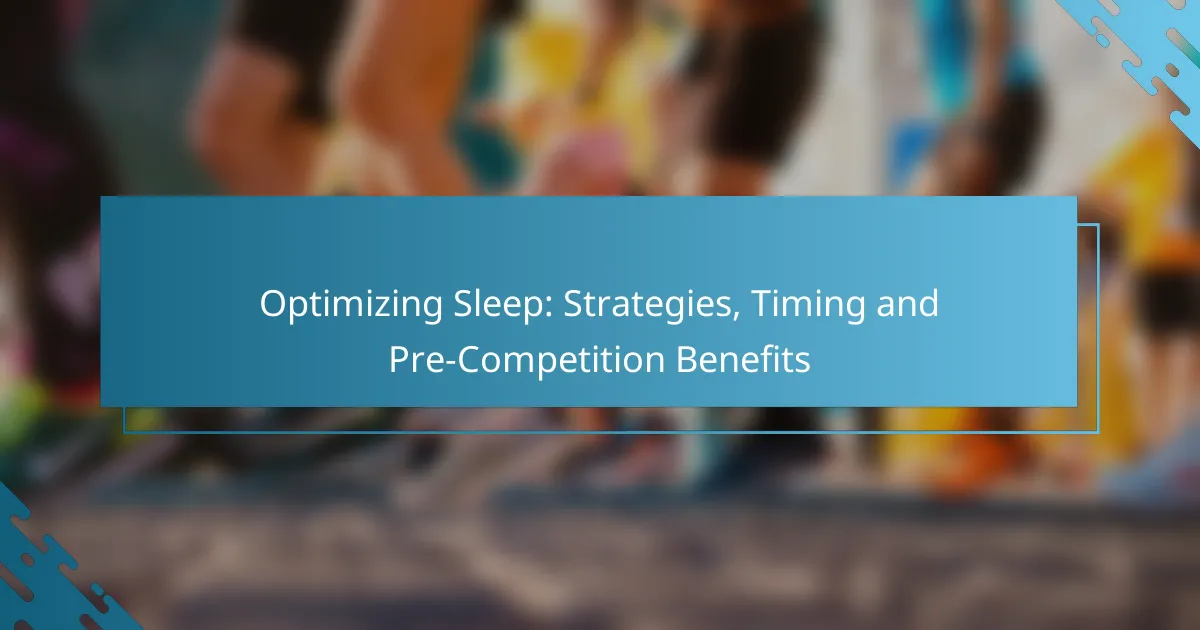Optimizing sleep is essential for athletes seeking to enhance their performance and overall well-being. By implementing effective strategies such as behavioral therapies and maintaining a consistent sleep schedule, individuals can significantly improve their sleep quality. Additionally, aligning sleep timing with natural circadian rhythms can boost recovery and focus, ultimately leading to better outcomes in competitive environments.

What Are Effective Strategies for Optimizing Sleep?
Effective strategies for optimizing sleep include behavioral therapies, hygiene practices, relaxation techniques, environmental adjustments, and maintaining a consistent sleep schedule. Implementing these methods can significantly enhance sleep quality and overall well-being.
Cognitive Behavioral Therapy for Insomnia
Cognitive Behavioral Therapy for Insomnia (CBT-I) focuses on changing thoughts and behaviors that contribute to sleep difficulties. It typically involves identifying negative beliefs about sleep and replacing them with positive, realistic ones.
CBT-I may include techniques such as sleep restriction, stimulus control, and cognitive restructuring. Many individuals find this approach effective, often leading to long-term improvements in sleep without the need for medication.
Sleep Hygiene Practices
Sleep hygiene refers to a set of practices that promote consistent, uninterrupted sleep. Key practices include maintaining a regular sleep schedule, avoiding caffeine and heavy meals close to bedtime, and limiting screen time before sleep.
Creating a pre-sleep routine can signal to your body that it’s time to wind down. Simple actions like reading a book or taking a warm bath can help prepare you for a restful night.
Relaxation Techniques
Relaxation techniques such as deep breathing, meditation, and progressive muscle relaxation can help reduce stress and anxiety, making it easier to fall asleep. These methods encourage a calm mind and body, which are essential for quality sleep.
Incorporating these techniques into your nightly routine can enhance your ability to relax and transition into sleep. Even a few minutes of focused breathing can make a noticeable difference.
Sleep Environment Optimization
Optimizing your sleep environment involves creating a space conducive to rest. This includes keeping the bedroom dark, quiet, and cool, as well as investing in a comfortable mattress and pillows.
Consider using blackout curtains, white noise machines, or earplugs to minimize disturbances. A well-organized and clutter-free bedroom can also promote a sense of calm and relaxation.
Consistent Sleep Schedule
Maintaining a consistent sleep schedule is crucial for regulating your body’s internal clock. Aim to go to bed and wake up at the same time every day, even on weekends, to reinforce your sleep-wake cycle.
Try to limit variations in your sleep schedule to no more than an hour. This consistency helps improve sleep quality and makes it easier to fall asleep and wake up naturally.

How Does Sleep Timing Affect Performance?
Sleep timing significantly influences athletic performance by aligning rest periods with the body’s natural circadian rhythms. Properly timed sleep can enhance recovery, focus, and overall physical capabilities during competitions.
Impact of Circadian Rhythms
Circadian rhythms are the body’s internal clock that regulates sleep-wake cycles over a 24-hour period. Athletes who align their sleep schedules with these rhythms often experience improved alertness and performance. For instance, sleeping during the night and being active during the day can optimize hormonal balance and energy levels.
Disruptions to circadian rhythms, such as late-night training or travel across time zones, can lead to fatigue and decreased performance. Athletes should aim to maintain consistent sleep patterns, even when their schedules change, to minimize these negative effects.
Optimal Sleep Duration for Athletes
The optimal sleep duration for athletes typically ranges from 7 to 9 hours per night, though some may require slightly more. Quality sleep is crucial for muscle recovery, cognitive function, and overall health. Athletes should prioritize uninterrupted sleep to maximize these benefits.
Short naps of 20-30 minutes can also be beneficial, especially if longer sleep periods are not feasible. These naps can enhance alertness and performance without causing sleep inertia, which can occur with longer naps.
Pre-Competition Sleep Strategies
In the days leading up to a competition, athletes should focus on establishing a consistent sleep routine. This includes going to bed and waking up at the same time daily to reinforce their body’s natural rhythms. Additionally, creating a relaxing pre-sleep environment can help improve sleep quality.
Avoiding stimulants like caffeine and electronic devices in the evening can also enhance sleep readiness. Athletes might consider using techniques such as meditation or light stretching to promote relaxation before bedtime.

What Are the Pre-Competition Benefits of Sleep?
Sleep plays a crucial role in enhancing performance before competitions by improving cognitive function, physical capabilities, and emotional stability. Adequate rest can lead to better decision-making, increased strength, and a more positive mindset, all of which are vital for success in competitive settings.
Enhanced Cognitive Function
Quality sleep is essential for optimal cognitive performance, particularly in high-pressure situations like competitions. It improves focus, reaction time, and decision-making abilities, allowing athletes to process information quickly and accurately.
To maximize cognitive benefits, aim for 7-9 hours of sleep before a competition. Avoid stimulants and screens before bedtime, as these can disrupt sleep quality and impair cognitive function during the event.
Improved Physical Performance
Sleep directly influences physical performance by enhancing muscle recovery, coordination, and endurance. Well-rested athletes typically exhibit better strength and agility, leading to improved results in their respective sports.
Consider incorporating naps into your routine, especially if you didn’t get enough sleep the night before. A short nap of 20-30 minutes can help boost energy levels and performance without causing grogginess.
Better Mood Regulation
Sleep significantly impacts mood, which can affect motivation and stress levels before competitions. Adequate rest helps regulate emotions, reducing anxiety and irritability, allowing athletes to maintain a positive outlook.
To promote better mood regulation, establish a consistent sleep schedule and create a calming pre-sleep routine. Techniques such as mindfulness or light stretching can help ease tension and prepare the mind for rest.

What Factors Influence Sleep Quality?
Sleep quality is affected by various factors including diet, stress levels, and physical activity. Understanding these influences can help individuals optimize their sleep for better health and performance.
Diet and Nutrition
Diet plays a crucial role in sleep quality. Consuming heavy meals close to bedtime can lead to discomfort and disrupt sleep. Aim for a balanced diet rich in fruits, vegetables, whole grains, and lean proteins while limiting caffeine and sugar intake, especially in the hours leading up to sleep.
Consider incorporating sleep-promoting foods such as almonds, bananas, and oatmeal, which contain nutrients that may help improve sleep. Staying hydrated is important, but avoid excessive fluid intake right before bed to minimize nighttime awakenings.
Stress and Mental Health
High stress levels and poor mental health can significantly impact sleep quality. Chronic stress can lead to insomnia or restless nights, making it essential to manage stress effectively. Techniques such as mindfulness, meditation, and deep-breathing exercises can promote relaxation and improve sleep.
Creating a calming bedtime routine can also help signal to your body that it’s time to wind down. Activities like reading, gentle stretching, or taking a warm bath can reduce anxiety and prepare you for restful sleep.
Exercise and Physical Activity
Regular physical activity is beneficial for sleep quality. Engaging in moderate exercise can help you fall asleep faster and enjoy deeper sleep. Aim for at least 150 minutes of moderate aerobic activity each week, but avoid vigorous workouts close to bedtime as they may have a stimulating effect.
Incorporating activities like yoga or stretching in the evening can promote relaxation and improve sleep readiness. Be mindful of your body’s signals; if you find that exercising late disrupts your sleep, consider adjusting your workout schedule to earlier in the day.

How Can Athletes Choose the Right Sleep Aids?
Athletes can choose the right sleep aids by considering their specific needs, the effectiveness of each option, and potential side effects. It’s essential to evaluate the timing, dosage, and individual responses to different aids to optimize sleep quality and performance.
Melatonin Supplements
Melatonin supplements are popular among athletes for regulating sleep cycles. They work by mimicking the natural hormone that signals the body to prepare for sleep, making it easier to fall asleep faster. A typical dose ranges from 0.5 mg to 5 mg taken about 30 to 60 minutes before bedtime.
While generally safe for short-term use, athletes should be cautious of potential side effects like daytime drowsiness or altered sleep patterns. It’s advisable to consult a healthcare provider before starting melatonin, especially for those with underlying health conditions or those taking other medications.
Herbal Remedies
Herbal remedies such as valerian root, chamomile, and passionflower are often used to promote relaxation and improve sleep quality. These natural options can be effective for some athletes, providing a gentle approach without the risk of dependency associated with prescription medications.
When considering herbal remedies, it’s important to check for quality and purity, as these products are not always regulated. Athletes should also be aware of potential interactions with other supplements or medications they may be taking.
Prescription Sleep Medications
Prescription sleep medications, such as benzodiazepines or non-benzodiazepine sedatives, can be effective for short-term sleep issues. These medications work by enhancing the effects of neurotransmitters that promote sleep, but they come with a risk of dependence and side effects like grogginess or impaired coordination.
Due to their potential for addiction and other complications, athletes should use prescription sleep medications only under the guidance of a healthcare professional. Regular monitoring is essential to evaluate effectiveness and adjust dosages as needed.
